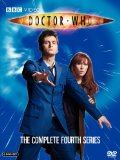| Reviews & Columns |
|
Reviews DVD TV on DVD Blu-ray 4K UHD International DVDs In Theaters Reviews by Studio Video Games Features Collector Series DVDs Easter Egg Database Interviews DVD Talk Radio Feature Articles Columns Anime Talk DVD Savant Horror DVDs The M.O.D. Squad Art House HD Talk Silent DVD
|
DVD Talk Forum |
|
|
| Resources |
|
DVD Price Search Customer Service #'s RCE Info Links |
|
Columns
|
|
|
Doctor Who: The Complete Fourth Series
BBC Worldwide // Unrated // November 18, 2008
List Price: $99.98 [Buy now and save at Amazon]
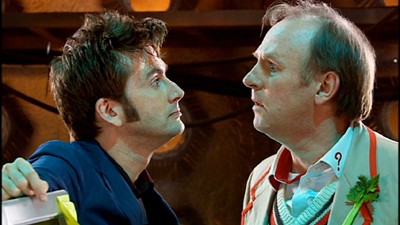 Russell T. Davies and David Tennant may not be done with "Doctor Who" just yet - the producer and star still have a handful of special episodes lined up to carry us through until the new cast and crew take over in 2010 - but the fourth season (or "series," if you prefer) of the Time Lord's new adventures feels every bit the swan song for both. It's the best season yet, and it ends so spectacularly that the final episode is, in its own fabulous way, an enormous "thank you" to everyone who helped not only revive the franchise, but expand it beyond fans' wildest dreams.
Russell T. Davies and David Tennant may not be done with "Doctor Who" just yet - the producer and star still have a handful of special episodes lined up to carry us through until the new cast and crew take over in 2010 - but the fourth season (or "series," if you prefer) of the Time Lord's new adventures feels every bit the swan song for both. It's the best season yet, and it ends so spectacularly that the final episode is, in its own fabulous way, an enormous "thank you" to everyone who helped not only revive the franchise, but expand it beyond fans' wildest dreams.Before kicking off the season proper, executive producer/head writer Davies and his team first had to contend with a couple of important holiday specials. Produced for the Children in Need telethon, the mini-episode "Time Crash" teamed up current Doctor Tennant with fifth Doctor Peter Davison. While we've met friends and villains from the old series, this is the first time since the show's revival that the Doctor would meet one of his former selves.
With only eight minutes to spare, writer Steven Moffat goes light on the plot (two TARDISes collide, everything must be fixed before the universe tears itself a hole the size of Belgium) and instead turns the story into a celebration of Davison's era in the role, first through winking in-jokes and lighthearted jabs (the brainy specs! the boyish frown! the celery!), then through unabashed tribute. Moffat and Tennant have both said they were raised on Davison's Doctor, and as a fellow Fifth Doctor fanatic ("Castrovalva" was my introduction to the show, so long, long ago), I must admit to getting misty when Tennant's Doctor explains his nostalgic affection in a monologue bursting with pride: "You were my Doctor." He was my Doctor, too, and hats off to giving him proper due.
December 2007 brought us the show's third consecutive Christmas special - and the second to be unconnected from the following season. Written by Davies, "Voyage of the Damned" puts the Doctor aboard the Titanic - a space cruiser designed, inside and out, as an exact replica of the doomed vessel. (Its builders apparently didn't do much research as to why the ship's name was so well-known on Earth.) The passengers are intergalactic travelers out to enjoy the foreign holiday of "Christmas" on this small, out-of-the-way planet.
This being the Titanic, of course, things go very wrong, the ship's robot servants have mutinied and are killing off everyone in sight, and the ship is soon on a collision course with London, where the impact will wipe out all life on Earth. What follows is a playful, thrilling reworking of "The Poseidon Adventure," as the Doctor leads a group of survivors to safety across a myriad of disaster movie-style dangers.
As an introduction to "Doctor Who," "Voyage" works perfectly: the surroundings are alien yet familiar, and a (somewhat) lack of references to past episodes won't confuse newcomers. Davies' script is funny and sad, packed with memorable characters, bursting with action and colorful sci-fi flourishes but not at the expense of an actual story. And it's loaded with those bold flourishes Davies loves so much, like the cheap but effectual killing off of unexpected secondary characters, or the unnecessary but completely wonderful dialogue embellishments. Consider this bit, where the Doctor stops everything to remind us to stay tuned, he'll be saving the day before dinnertime:
"I'm the Doctor. I'm a Time Lord. I'm from the planet Gallifrey in the Constellation of Kasterborous. I'm 903 years old, and I'm the man who's gonna save your lives and all six billion people on the planet below. You got a problem with that?"
Who writes stuff like that? And who's able to pull it off? These guys, apparently. And how.
The whole thing moves like gangbusters, thanks in part to James Strong's crisp direction and a script that plows from one ripping action sequence to the next. It ends up being one of the most bombastic of all the new "Who" stories, and yet there's a quiet sorrow underneath. Davies has tinkered with the idea of the Doctor as a lonely god for some time now, and the fourth season will see the notion expand further; here, the Doctor finds himself emotionally lost, in desperate need of companionship and adventure yet determined to remain alone lest he risk the lives of those he loves.
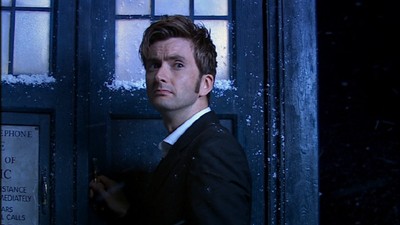 Also lost, in her own way, is Astrid, played with verve by guest star Kylie Minogue. A waitress who dreams of seeing the stars, Astrid is set up as something of a love interest for the Doctor, something Davies enjoys more than he probably should, considering the series' previous no-romances rule. Having first lost Rose and then spurned Martha, the Doctor seems ready for lovin', with Astrid, keenly taken in by the Time Lord's charms, eager to accept. It's not to be, of course - Minogue has no plans of returning to the series - and Astrid's send-off is a bittersweet ending to this chaotic adventure.
Also lost, in her own way, is Astrid, played with verve by guest star Kylie Minogue. A waitress who dreams of seeing the stars, Astrid is set up as something of a love interest for the Doctor, something Davies enjoys more than he probably should, considering the series' previous no-romances rule. Having first lost Rose and then spurned Martha, the Doctor seems ready for lovin', with Astrid, keenly taken in by the Time Lord's charms, eager to accept. It's not to be, of course - Minogue has no plans of returning to the series - and Astrid's send-off is a bittersweet ending to this chaotic adventure.It wouldn't be until April 2008 that the fourth season would officially launch, with "Partners in Crime." Here, Catherine Tate, who guest starred in the 2006 Christmas special, returns in full force as Donna Noble. Her casting caused a bit of a stir among fans; would a comic actress be a drag on the sci-fi show? Not at all. Tate proved herself to be the new series' best companion yet, capable of high comedy and big drama, holding her own, and then some, with Tennant's geek-hero Doctor.
Perhaps it was Davies' decision to avoid romantic entanglements for this season. There's no need for unrequited anything when it comes to Donna and the Doctor, who instead work as time-traveling best mates, equals if not in intellect, then in excitement for the unknown and compassion for all life. Over the course of the season, Donna would grow into powerhouse player in the Doctor's universe, her bossy, sassy ways ultimately hiding a deeper question, to which every one of us can relate. In late episodes, Donna dismisses accounts of her importance: "But I'm just a temp!" She has no faith in her own abilities, yet ultimately will help save our universe, and many more beyond. All of us, the show exclaims, has the capacity for much more than we would believe. None of us are "just" anything. Davies (who penned the season's final four episodes, when this theme would truly take hold) gets a bit excessive in driving the point home, but he makes it work, and so does Tate, who brings a much needed compassion to the character.
Every episode in this season is a highlight, from the opener "Partners in Crime" (which makes the most of Tennant and Tate's comic rapport), through visits to Pompeii ("The Fires of Pompeii"), run-ins with the alien warrior race the Sontarans ("The Sontaran Stratagem," "The Poison Sky") and even Agatha Christie ("The Unicorn and the Wasp"), to a nifty experiment in "Twilight Zone"-inspired paranoia ("Midnight"). The Ood - those mysterious aliens from "The Impossible Planet" - return in Keith Temple's "Planet of the Ood," which uses a sort of future slave farm to create one of the season's most emotionally devastating tales. Stephen Greenhorn's "The Doctor's Daughter" takes a sly approach at ratings bait (the Doctor has a daughter! An artificially created daughter, yes but still!) while musing on the Time Lord's long, secret life as well as the nature of war itself, all with a few nifty twists. Davies' own "Turn Left" is a doozy of alternate history/parallel universe pondering, taking old "what if?" standbys and building great drama on top of them, an entire new world, elegantly detailed and utterly heartbreaking, blossoming from a single choice. (Bernard Cribbins, playing Donna's spry granddad throughout the season, gets some remarkable moments here, revealing his worth an invaluable addition to the series.)
The season's most notable stories are two of its two-parters. In his scripts for "Silence in the Library" and "Forest of the Dead," Steven Moffat finally breaks through an idea that surprisingly has never been raised in the franchise's lengthy history: could the Doctor ever meet someone from his future? Here, he does. Professor River Song (played beautifully by Alex Kingston) knows the Doctor from her past, his future. She has his diary - should he take a peek at things to come? Ah, but those would be spoilers.
For a show about a time traveler, "Doctor Who" has too often ignored time travel as an actual theme - for the most part, his TARDIS is instead merely a way to get from place to place, story to story. To the production staff, time travel is just a nifty way of putting its hero in caveman times, or the distant future, or another planet; the scripts would then set the TARDIS off to the side and deal with the adventures at hand. The actual complications of all that with all that crisscrossing the space-time whatnots only popped up in a handful of scripts.
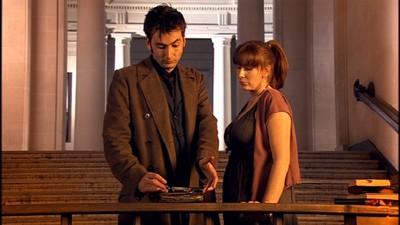 Moffat has now rectified this three times, first in "The Girl in the Fireplace," in which, thanks to some oddball wormhole goings on, a few minutes to the Doctor equaled a few decades to Madame de Pompadour, to fascinating effect. The next season's "Blink" involved messages left waiting through the years and innocents hijacked backwards in time, resulting in that year's best episode. Now, in "Silence in the Library" and "Forest of the Dead," Moffat looks to where the current Doctor cannot and decides it's high time for the Time Lord to meet an old friend for the first time. And it's no gimmick, but the foundation for remarkable character drama. (Just watch the untold agony in Kingston's eyes as River realizes her Doctor doesn't know her.)
Moffat has now rectified this three times, first in "The Girl in the Fireplace," in which, thanks to some oddball wormhole goings on, a few minutes to the Doctor equaled a few decades to Madame de Pompadour, to fascinating effect. The next season's "Blink" involved messages left waiting through the years and innocents hijacked backwards in time, resulting in that year's best episode. Now, in "Silence in the Library" and "Forest of the Dead," Moffat looks to where the current Doctor cannot and decides it's high time for the Time Lord to meet an old friend for the first time. And it's no gimmick, but the foundation for remarkable character drama. (Just watch the untold agony in Kingston's eyes as River realizes her Doctor doesn't know her.)The rest of the story, featuring a planet-sized library, the dream world of a mysterious girl, and another alternate universe for Donna, is outstanding - and scary as hell, using flesh-eating shadows as the main villains. Shadows! If this two-parter doesn't prove the brilliance of this series to you, there's no hope for you at all.
The other top-of-the-heap story is the season-ending two-parter, "The Stolen Earth" and "Journey's End." This is where Davies pulls out all the stops, bringing together all the key characters in the producer's newly minted "Whoniverse," including Martha Jones, Sarah Jane Smith and her son Luke, Captain Jack and his Torchwood team, Former Prime Minister Harriet Jones, and yes, even Rose Tyler. The Daleks are back, too, along with some bigger surprises, and the whole dang thing turns into an avalanche of fannish delight. Davies himself has long shown fangirl tendencies in his writing; his wistful romantic gestures between the Doctor and Rose have always been questionable, unless, that is, you're a diehard Doctor-Rose fanatic, in which case he's teased and tormented you long enough, and the resolution of this long-standing romance is as glorious and well earned as the logic required to get there is bumpy and borderline fanfic-ish.
Davies composes the perfect cliffhanger at the end of "The Stolen Earth," with every one of its characters in dire straits (especially the Time Lord himself, whose final words left millions of jaws dropped across the viewing world) and no possible way of rescue. Naturally, the opening scenes of "Journey's End" would require some cheats, some sneakiness, and some impossible last-minute escapes, but it's all worth it. This is Davies going out in a blaze of glory, giving all of his characters one last hurrah while taking the adventure so far over the top it requires the entire planet to zip across the universe.
There's much more to champion about "Journey's End," but that would require spoilers, something the Doctor himself wishes to avoid. So let's just call it a high note for all involved, with even Davies' goofiest ideas (come on, two of them?) coming across splendidly. It's the sort of episode you watch from start to finish with an enormous grin on your face, hoping it'll never end.
The finale presented the "Who" crew with a fabulous parting gift: for the first time in franchise history, "Doctor Who" topped the UK ratings charts. Better still, both "The Stolen Earth" and "Journey's End" received a whopping 91% as its Audience Appreciation Index, one of the highest ratings ever given to a television program. A high note, indeed.
As the season progressed, Davies, executive producer/Head of Drama for BBC Wales Julie Gardner, and producer Phil Collinson all announced they were leaving the show, and in October, David Tennant revealed he, too, will be retiring as the Doctor. Davies and Tennant will stay on through the various specials set for 2009; Steven Moffat, who received praise for his excellent work on "Who" (as well as "Coupling" and "Jekyll") will take over for Davies; a new Doctor has yet to be cast. In a way, this collective changing of the guard is a good thing for the series, allowing Moffat to start fresh with a new cast and new direction. And while we still have a few more episodes from the Tenth Doctor to come, we'll always remember this fourth season as the year Davies and Tennant went out on top.
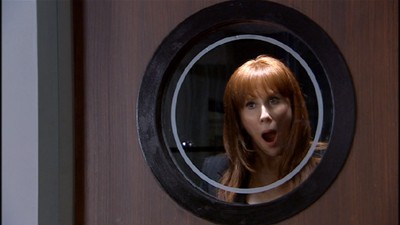 The DVD
The DVDBBC Video collects all thirteen episodes and two specials for their six-disc set "Doctor Who: The Complete Fourth Series." Fans accustomed to the high quality of previous "Who" releases will be pleased to find this new collection matches them in every regard.
The only drawbacks to be found here are minor quibbles at best: the episodes are spread out over the discs in uneven fashion (why cram four onto one disc when there's plenty of extra room on the first disc?), and the animated menus are, as always, just lengthy enough to be a bother. Other than that, the set is as perfect as can be.
The six disc are packaged in a four-panel digipak with three double trays (two overlapped discs per tray); the digipak then fits nicely into a glossy cardboard slipcover. A 20-page episode guide booklet (featuring notes from Davies) fits into a pocket in the digipak. If you have any of the previous "Who" season sets, you'll recognize the layout.
The episodes in this set are included in original broadcast order. They are:
Disc One: "Voyage of the Damned" (and, listed as an extra, "Time Crash").
Disc Two: "Partners in Crime", "The Fires of Pompeii", and "Planet of the Ood".
Disc Three: "The Sontaran Stratagem", "The Poison Sky", "The Doctor's Daughter", and "The Unicorn and the Wasp".
Disc Four: "Silence in the Library", "Forest of the Dead", and "Midnight".
Disc Five: "Turn Left", "The Stolen Earth", and "Journey's End".
Video & Audio
Outstanding, as expected. The 1.78:1 anamorphic widescreen transfers of every episode are downright gorgeous, looking even better than their broadcast versions. Detail is crisp, colors are lively, black levels are deep and rich.
The Dolby 5.1 is equally exceptional, with crisp dialogue and a rich, full presentation of Murray Gold's lush musical score. Sound effects are nicely balanced. Optional English subtitles are included.
Extras
Each episode contains a commentary track, all of which are lively, informative, and downright fun. Bear with me as I struggle to keep track of everyone involved:
-- "Voyage of the Damned": composer Murray Gold, actor Russell Tovey, and first assistant director Peter Bennett.
-- "Partners in Crime": executive producer Julie Gardner, director James Strong, and writer/producer Russell T. Davies.
-- "The Fires of Pompeii": Actors David Tennant and Catherine Tate, and production manager Tracie Simpson.
-- "Planet of the Ood": Director Graeme Harper and actor Roger Griffiths.
-- "The Sontaran Stratagem": Gardner, actor Dan Starkey, and prosthetics designer Neill Gorton.
-- "The Poison Sky": Tennant, Davies, and producer Susie Liggat.
-- "The Doctor's Daughter": Tate, actress Georgia Moffett, and music orchestrator/conductor Ben Foster.
-- "The Unicorn and the Wasp": Actors Felicity Kendal and Fenella Woolgar.
-- "Silence in the Library": Tennant, Gardner, and writer Steven Moffat.
-- "Forest of the Dead": Director Euros Lyn, script editor Helen Raynor, and costume designer Louise Page.
-- "Midnight": Tennant, Davies, and director Alice Troughton.
-- "Turn Left": Tate and actors Jacqueline King and Bernard Cribbins.
-- "The Stolen Earth": Davies, Gardner, and Tennant.
-- "Journey's End": Davies, Tennant, and Tate.
(Note: Access to the commentaries is found under the Set Up menu and not the Special Features menu. Of course, you can also get there via your remote's audio button.)
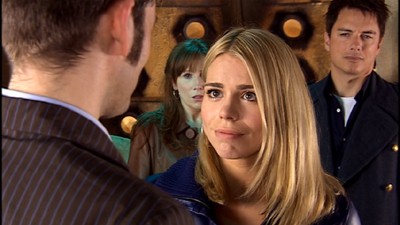 Other extras are as follows, disc by disc:
Other extras are as follows, disc by disc:Disc One:
As mentioned above, the brilliant short feature "Time Crash" (8:01) is filed under Special Features.
"David Tennant's Video Diary" (14:53) is a surprisingly fun, not-surprisingly charming home video of Tennant and Julie Gardner racing (with police escort!) to be the guest of honor at the Blackpool Illuminations.
Three deleted scenes (2:35 total) from "Voyage of the Damned" flesh out a bit of the story and allow some juicy character moments. Davies introduces, explaining why each scene was cut. As with all deleted scenes in this set, these are in unpolished form, edited together with music but often without finished visual effects (or even the filtering to remove that shot-on-video look); such a look shouldn't be a problem to fans, who'll be delighted to see all the "Who" they can get.
Five trailers (3:35) for "Voyage of the Damned" - two that played in theaters, three more from television - do a fine job of building anticipation for the Doctor's return.
The trailer for the second season of "Torchwood" and a promo for BBC America plays as the disc loads.
Disc Two:
"Howard Attfield Deleted Scenes" (6:45) collects all the footage shot with actor Howard Attfield, originally cast as Donna's father. Attfield passed away after filming his scenes for "Partners in Crime," and the scenes were reworked and reshot with Bernard Cribbins as Donna's grandfather. Attfield's performance here is gentle and delightful, and the inclusion of his final, unused work is a fine testament to the actor. Again, Davies provides an introduction explaining the circumstances.
Another batch of deleted scenes (10:37), again hosted by Davies, reveal extended bits from the disc's three episodes, including some alternate takes from Tate and additional moments with Tim McInnerny's Ood-enslaving baddie.
A batch of episode-specific trailers (3:43) includes the cinema trailer for the season four launch.
The trailer for volume one of "Primeval" plays as the disc loads.
Disc Three:
More deleted scenes (13:45) and more Davies intros, although none are offered for the two Sontaran episodes. Most interesting here are alternate opening and closing scenes for "The Unicorn and the Wasp," showing Agatha Christie years after the events of the story.
The episode trailers (1:37) include a "Sontaran Teaser," designed to get old school fans excited about the classic villains' return.
A trailer for the first season of "The Sarah Jane Adventures" plays as the disc loads.
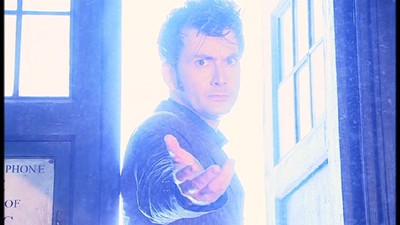 Disc Four:
Disc Four:Deleted scenes (6:33) and Davies intros, but this batch covers episodes on this disc as well as Disc Five. An alternate ending for "Journey's End" gives an additional final moment for Donna, plus a wowzer of a final shot teaser for the upcoming Christmas special (complete with the Doctor's trademark "What? What?!").
The next round of trailers (1:52) includes a promo for "Silence in the Library" that doubles as a teaser for the rest of the season.
Disc Five:
This second "David Tennant's Video Diary" (15:43) catches up with the star's home videos of the filming of the two-part season finale. Fun moments include visits with on-set technicians (so much work for so little screen time!) and actor John Barrowman squeeing (an actual squee!) in delight at the sight of the episode's surprise villain.
"The Journey (So Far)" (30:54) finds cast and crew sharing their thoughts on characters, events, and milestones from the four seasons of "Doctor Who" stories.
The final batch of episode trailers (1:57) includes two teasers hyping the return of those nasty Daleks.
Disc Six:
This disc is devoted entirely to "Doctor Who Confidential," the making-of specials that aired on BBC Three following the "Who" broadcasts. The versions presented here are the "Cut Down" versions, shortened reworkings of these documentaries produced for rerun purposes. There are fourteen "Confidentials" in all (2:59:26), one for each episode of the season. Narrator Anthony Head walks us through all the behind-the-scenes details, creating an overload of information. While it would've been better to get the complete cuts of these documentaries, space isn't permitting, and these "Cut Down" versions are a welcome second choice.
(Note: All bonus material is presented in 1.78:1 anamorphic widescreen and features optional English subtitles.)
Final Thoughts
All that, and I feel like I've barely scratched the surface at why the fourth season of "Doctor Who" is outstanding television. The excellent guest stars, the impressive set designs, the sharp direction, the detailed creature makeup, the total terror of those library shadows, and on, and on. You'll just have to see for yourself, really, and this six-disc set offers plenty of excuses to rewatch again and again. "Doctor Who: The Complete Fourth Series" is a monumental work of storytelling enhanced by a monumental DVD release. Put this one in the DVD Talk Collector Series.
Interested in what DVD Talk had to say about previous "Doctor Who" releases? Click here for a handy list of all of our "Who" reviews.
|
| Popular Reviews |
| Sponsored Links |
|
|
| Sponsored Links |
|
|
| Release List | Reviews | Shop | Newsletter | Forum | DVD Giveaways | Blu-Ray | Advertise |
|
Copyright 2024 DVDTalk.com All Rights Reserved. Legal Info, Privacy Policy, Terms of Use,
Manage Preferences,
Your Privacy Choices | |||||||









